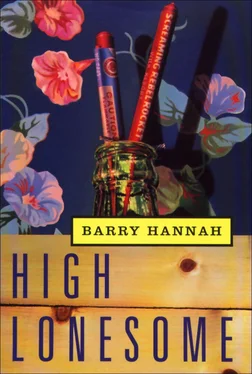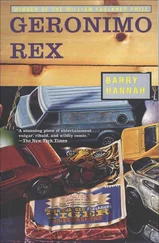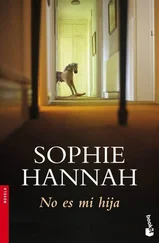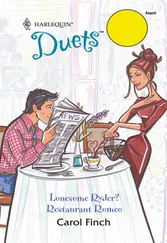So now Minkle. It was not clear for a while whether she’d moved in with Modock to save him or herself.
She had a job at Wal-Mart and had begun wearing hosiery. She came up on that northern path they had made in the yard, almost under my window, to get in her car, a plain Ford given over by her prisoner ex-husband. She had a clean face and new shoes. Then she ran in the streets in the evenings, with a radio in her head, just like a coed. I saw her disappear down the hill, all shoe soles and butt, in her jogging Speedo. She was getting an overall suntan, perhaps at a gym, and in my indifference I watched the woman change from plain to outright fetching. In my patient geezer lechery I did admire her. She was a good big sister to Modock. The place was cleaner and there were flowers around. The hound got washed once a week and began to appear sleek and noble, with a nice leather collar and vaccination tag on him. I think even his posture improved. He would stare out at the street like a perfectly adapted suburban philosopher, rich in black and tan.
I was out getting the paper in the drive early on a Saturday, didn’t see it, and bent down to a bush where it might be hidden. She was in the bush and whapped me upside the head with my own rolled newspaper.
Lookin’ for somethin’, neighbor?
You’re a rough one, aren’t you?
Can’t you take it?
I reached over and yanked down her Speedo bra, then slapped her mildly.
Good morning, I said.
She set herself right, not as shocked as she might be and a smile coming up.
I brought you some rent. She had money in her hand. I looked at it and was puzzled, then all at once touched. It was green and black cash, somewhat wet in her palm, twenties I guess. You could feel the hours in it, the earning, like the money of a kid at a lemonade stand.
When you get on your feet—, I started.
We on our feet.
Very well.
I almost didn’t take it. Maybe I wanted to own them a bit longer.
Modock’s not going to college, is he? I said to her.
No. But I am. He’s swore nonviolence. Too many persons around give him trouble.
What does he do after work over there?
I have to open a big can of whupass on bro now and then, get him out of that stare, not eatin’.
You beat up Modock?
I get his attention. What he did, there’s not many like him in the world, you know. But he’s got to unbrood himself and move on.
There was a man in town who had killed his mother. Her death was a drunken accident in a car he drove through police roadblocks with his mother, eighty, as a passenger. She was thrown from the car. After his arrest they watched him for suicide. Only a mattress in a windowless room at the hospital. We all expected him to go to prison. It was the worst thing one could do, this matricide, and prison would not touch the guilt, we imagined. I suppose we expected him to crumble and seek hell. But mourning has its limits. I would guess there might come a day when you do not murder yourself with grief, you have become a part of it. You are the definition of grief, and you keep moving, a monster beyond atonement, a shadow of guilt on the wall to your neighbors. His sister wrote the judge a moving letter. The man did no prison time. He is simply doing time there in the grocery store. People, including me, do not know how to look at him even when we say hello. He is the permanent bottom line of horror, maybe even another breed.
I wondered should this man and Modock meet. Should they form a rare club.
But Modock worked and came home. He was looking thin and sorry. They told me he was neither good nor bad at work. His boss said this odd thing: Modock doesn’t want to know or remember things. Every day it’s like he just first came on the job . He didn’t mind being shouted at. He never laughed at a joke.
They had been in town several months before Modock missed a day of work. I noted his leftward auto at the curb around eleven and went over. The house was dark and Modock sat on a far chair in boxer underwear with a bar of light across his eyes. The eyes seemed out on stalks away from the grave and emaciated face. They seemed cracked with light inside. Modock had become a haint of his former self. He scared me. I got him a glass of water and felt heat coming off his body from his fingers. He said he had been throwing up a little. The old television was not on, only the hum of the refrigerator was heard, aggressive, a raw and odd tune here.
Black girls, he said. Two black girls at work found out what I did with my daddy. They said I had taken the hell from him and now the hell was in me. I was hell and I was in hell and there was forever a mark on me, which I already knew.
Now you’ve just talked yourself into a case of the flu, boy.
I don’t have the flu.
Your pa was begging you to shoot him. Like he was on fire and couldn’t stand it.
I was doing all right until somebody said it, them girls.
He wanted company in hell but don’t give it to him, nor to your mother.
I’m not having a new life.
Sink then. Call your mama and get another lease on the old shit.
Blackie in fact had been calling me for a while, always something, but unbearable when she was drunk. The police would not give back “my husband’s” camper or his clothes or Modock’s gun, either. She’d go down and raise hell at the station. But now she wanted to sell her life story for a great deal of money. I would write it. I’m afraid not, I told her. She then told me I’d better watch out for Modock. No, I won’t, I said.
In a week I saw the car over there, rammed up to the porch. Ebbnut was around, assisting something with a burred tail, moving it into the house. This was the bobcat, still muddy from the swamps near Carriba. Modock wasn’t moving out as I’d thought. They’d brought more of Carriba to him. Poor Ebbnut was even more swollen. Some say depression among the poor shows up instantly as fat. The boy was not only neckless but nigh to growing another face across. Blackie, of course, was lean in her alcoholism. Already she had married another wretch, a man who stayed behind the wheel. Modock had had three other stepdads while Henry was in prison. This one didn’t even cause a ripple. He seemed merely frozen in the act of valet. Imagine the bite of such love as he could wrest at evening from each day’s journey.
I suddenly thought of my own case. I had wanted a great woman but then I was not a great man, always in this swoon of brooding. Even my aldermanship was a stretch. I did not care that much.
Frozen at the wheel of this my old Mercury of a body, driven up on foreign shores, weary of the music from my ancient radio, beyond me barely intelligible voices in odd rooms, an eye out for the leap of the unexpected. It was ever thus. I was never firmly native to anywhere. Yet ravenous for the unexpected. Half amazed that others even bother to carry on.
I at last danced with Minkle. I saw her alone at that discotheque two art queers began with one’s grandfather money. It was an instant failure and I felt sorry for the fellows. They thought a revival would be all the rage. But not here. Only Minkle and a few others came. She was dancing with one of the owners under great speakers full of Donna Summer and the Bee Gees. There was a billiard table lit in the corner and big dying ferns of all nations set around. Big pulse, a raised platform for styling where sad queers offered themselves up to the lonely passion of the Pet Shop Boys. One grabbed a silver fireman’s pole and expressed himself around it, dying as if rammed by heaven.
I walked over and popped her a stout one against the head. Drunk and in blue jeans, I was not recognized at first. But then she held her head and smiled. At last I was Bob Bubb, famous old son of her orbit. I was down in the bottoms with the boys, lanterns and dogs on the hunt for a screaming bobcat, or painter as they called them down Carriba way.
Читать дальше












